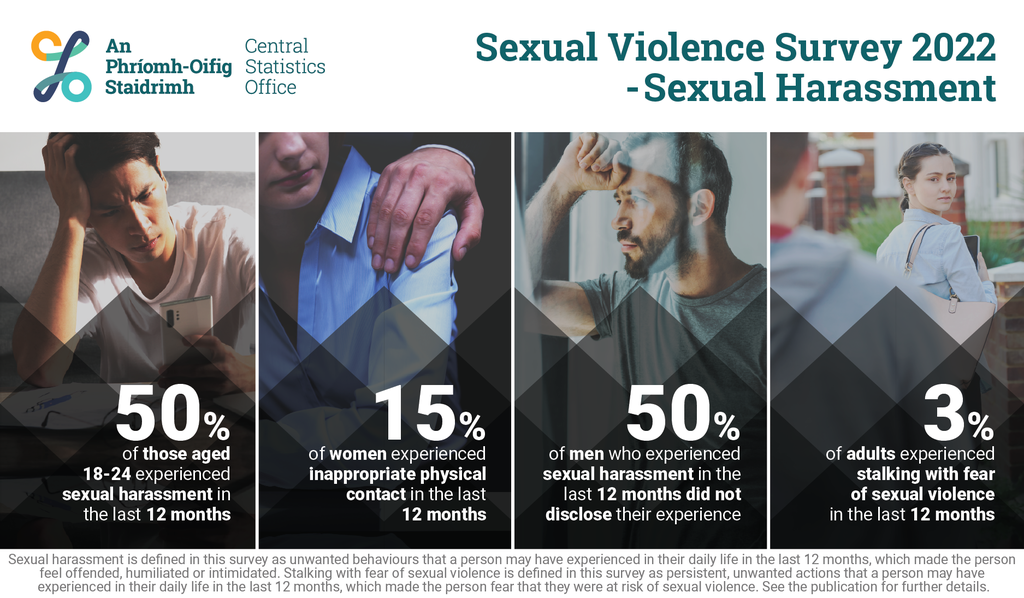Central Statistics Office releases thematic reports on sexual violence in Ireland
02 October 2023

Having initially released overall main findings from its Sexual Violence Survey in April, the CSO has since published a number of thematic reports dealing with specific strands, with its second release looking at Adult Experiences of Sexual Violence.
The third publication was launched on 22 June 2023, focusing on Childhood Experiences.
- Some 73% of those aged 18-24 who experienced sexual violence as a child were abused by another child (person under 18), while the equivalent figure for those aged 65 and over was 17%.
- Younger people reported experiencing sexual violence as a child at a higher rate than older people.
- Over four in 10 (41%) younger people aged 18-24 experienced sexual violence as a child compared with just over two in 10 (22%) aged 65 and over.
- Bisexual people reported over double the level (58%) of sexual violence as a child compared with heterosexual/straight people (28%). The equivalent rate for gay/lesbian people was 39%.
- Most perpetrators of child sexual violence were male. Over nine in ten adults (91%) who experienced non-contact sexual violence as a child and almost nine in ten adults (88%) who experienced contact sexual violence as a child reported that the perpetrator was male.
On 31 July, we saw the publication of the report on Disclosure of Experiences.
- Two-thirds (66%) of those aged 18-24 who experienced sexual violence as an adult and disclosed it had told a friend first, compared with 13% who told a family member.
- 36% of women who did not disclose any experience of sexual violence as an adult reported they felt ashamed or embarrassed, more than twice the rate for men (15%).
- Most adults (79%) who experienced sexual violence as an adult did not use a service, such as medical, counselling or social work.
- Almost half of men who experienced sexual violence as a child did not use a service because they thought what happened to them was not serious enough.
- Among adults who experienced sexual violence as a child and who used a support service, most (83%) found it helpful.
A fifth release on Sexual Harassment was issued on 27 September. It contained a wealth of information on the extent of sexual harassment, including that more than half of those aged 18-24 years had been sexually harassed in the previous 12 months. The CSO defines harassment as unwanted behaviours that a person may have experienced in the last 12 months, which made the person feel offended, humiliated or intimidated.
- Overall, one in five adults (20%) experienced sexual harassment in the last 12 months with women being over twice (28%) as likely to experience sexual harassment than men (13%).
- Women were almost four times more likely to have experienced inappropriate physical contact (15%) than men (4%).
- Over one in twelve young adults (8%) reported they had experienced their sexual images or videos being shared without their permission in the last 12 months, compared with 1% of those aged 55-64.
- Almost nine in ten adults (87%) who experienced sexual harassment reported that the perpetrator was male.
- Half (50%) of men who experienced sexual harassment in the last 12 months did not disclose their experience.
- In the last 12 months, 3% of adults experienced stalking with fear of sexual violence.
- Most people (70%) who experienced stalking with fear of sexual violence in the previous 12 months disclosed to someone about the experience.
Responding to the data, DRCC said it was vital that the new agency being established to oversee the country's response to domestic, sexual and gender-based violence be adequately resourced to address harassment across Ireland, and that the data underlined the need for adequate education among younger people on the harms of harassment.
The final report in this series, on public attitudes to sexual violence, will be published later in 2023.